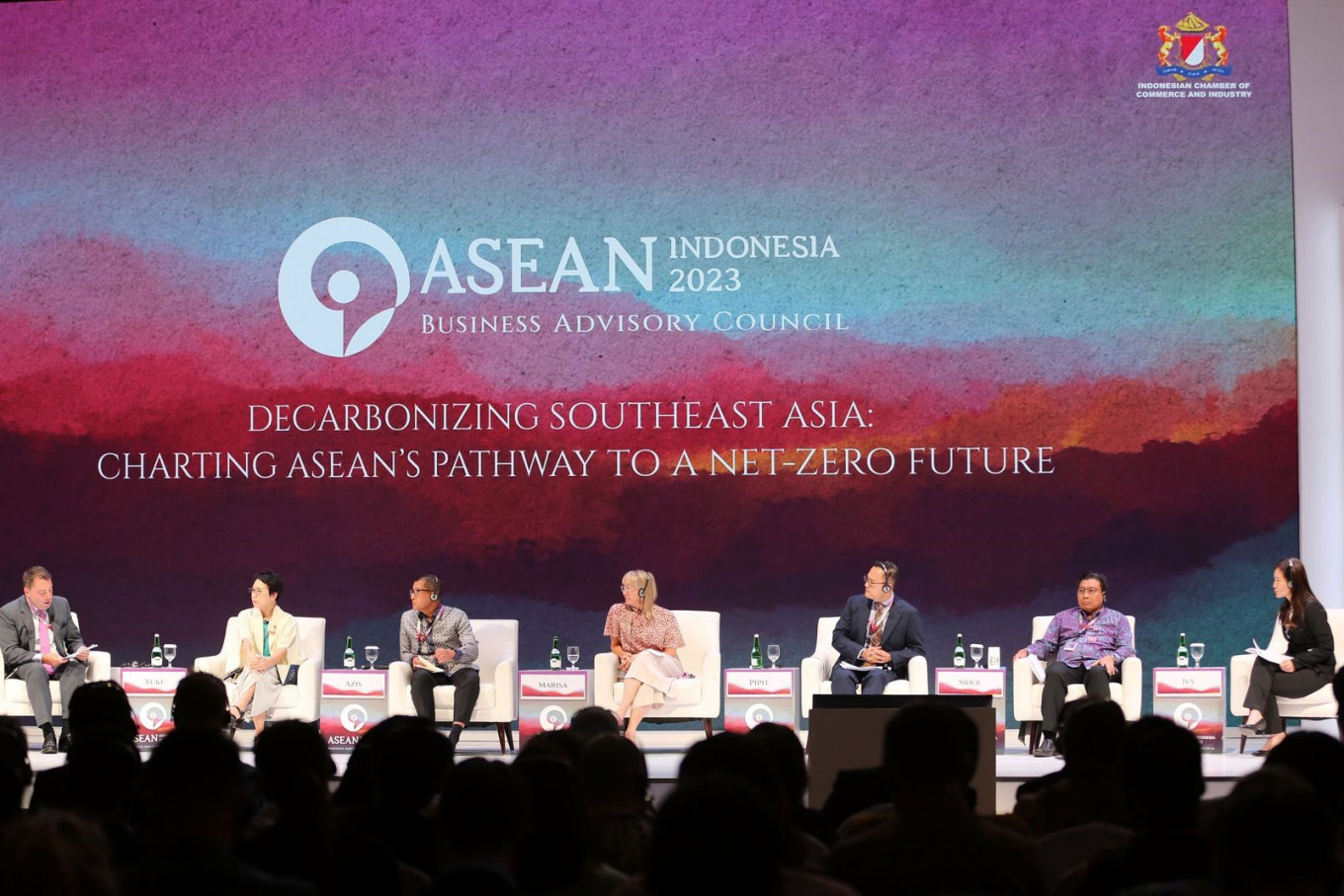Popular Reads
Top Results
Can't find what you're looking for?
View all search resultsPopular Reads
Top Results
Can't find what you're looking for?
View all search resultsAPRIL highlights efforts to achieve net zero, support Indonesia's FOLU Net Sink at ABIS
The private sector's crucial role in global emissions reduction and net zero goals took center stage at the ASEAN Business Investment Summit (ABIS), held in Jakarta on September 3, 2023.
Change text size
Gift Premium Articles
to Anyone
T
he private sector's crucial role in global emissions reduction and net zero goals took center stage at the ASEAN Business Investment Summit (ABIS), held in Jakarta on September 3, 2023. The discussions, leading up to the ASEAN Summit, underscored the urgency of addressing climate change in the ASEAN region.
In a panel titled "Decarbonizing Southeast Asia: Charting ASEAN's Pathway to a Net Zero Future," speakers highlighted the impact of climate change and the need for sustainable practices. Wayne Farmer, President of the Canada-ASEAN Business Council, Pipit Aneaknithi, President of Kasikornbank Thailand, Marisa Drew, Chief Sustainability Officer of Standard Chartered Bank, Yuki Yasui, Managing Director of the Glasgow Financial Alliance for Net Zero, Azis Armand, Vice President Director and CEO of Indika Energy, and Sihol Aritonang, President Director of PT Riau Andalan Pulp and Paper (RAPP), the operating arm of APRIL Group, represented various sectors.
Sihol Aritonang, President Director of PT RAPP, emphasized the risks climate change poses to businesses and how APRIL Group has responded with tangible efforts. As one of the world's largest producers of fiber, pulp, and paper, APRIL is renowned globally for its PaperOne product, available in over 110 countries.
APRIL Group's commitment to achieving net zero emissions includes decarbonization across all operational areas, increased land productivity aligned with sustainable forest management practices, and comprehensive restoration and conservation programs. Sihol explained, "In terms of land management, our approach to reducing carbon emissions is by increasing land productivity and reinforcing our commitment to conservation and restoration. Operationally, we are pursuing decarbonization in all aspects through investments in technology and science."
On the operational front, APRIL is actively adopting renewable and clean energy in its factory activities to reach its Climate Positive target by 2030. Currently, 88.6 percent of the overall energy balance for its mill comes from renewable sources, nearing its 90 percent goal. The installation of 11 megawatts of solar panels, out of a 50 MW target, plays a substantial role in contributing to this shift.
In total, the company has reduced the carbon emissions intensity of its products by 22 percent, making progress toward the 25 percent target by 2030. This reduction is achieved through reducing reliance on fossil fuels, improving energy efficiency, and transitioning to electric buses for employee commuting and general operations.
APRIL's efforts to achieve net zero emissions are in line with the Indonesian government’s FOLU (Forest and Other Land Uses) Net Sink program, aiming to make the forestry sector a net sink by 2030.
“We are committed to aligning our action to the national climate agendas through conservation, restoration, and responsible land management,” said Sihol.
Under the APRIL 2030 sustainability commitment, the company aims for a 50 percent increase in fiber productivity from industrial tree plantations (HTI) under its management. Fiber productivity has already increased by 13 percent from 2019 to 2022.
APRIL also upholds a 1-for-1 commitment, conserving one hectare of land for every hectare managed for production. These conservation areas remain free from emissions, a crucial part of the company's mitigation efforts. Progress in this commitment has reached 80 percent, with efforts to reach the 100 percent target actively pursued. This commitment is supported by a funding commitment of US$1 per ton of production, ensuring sustainable funding for conservation and restoration efforts.
One notable implementation of the 1-for-1 program is the Riau Ecosystem Restoration (RER), Sumatra's largest restoration project, spanning 150,000 hectares, equivalent to twice the size of Singapore. Nature-based solutions in the RER prove effective against climate change while offering a wide range of benefits, such as safeguarding biodiversity, supporting ecosystems, and promoting sustainable livelihoods.
APRIL has also made significant investments in science and technology. Since 2016, APRIL has constructed four greenhouse gas emission towers and monitoring equipment to gain a comprehensive understanding of GHG emissions in various land use types.
APRIL’s comprehensive approach, including decarbonization, land productivity enhancement, and conservation efforts, is one of the ways for businesses aiming to contribute to a net zero future.











